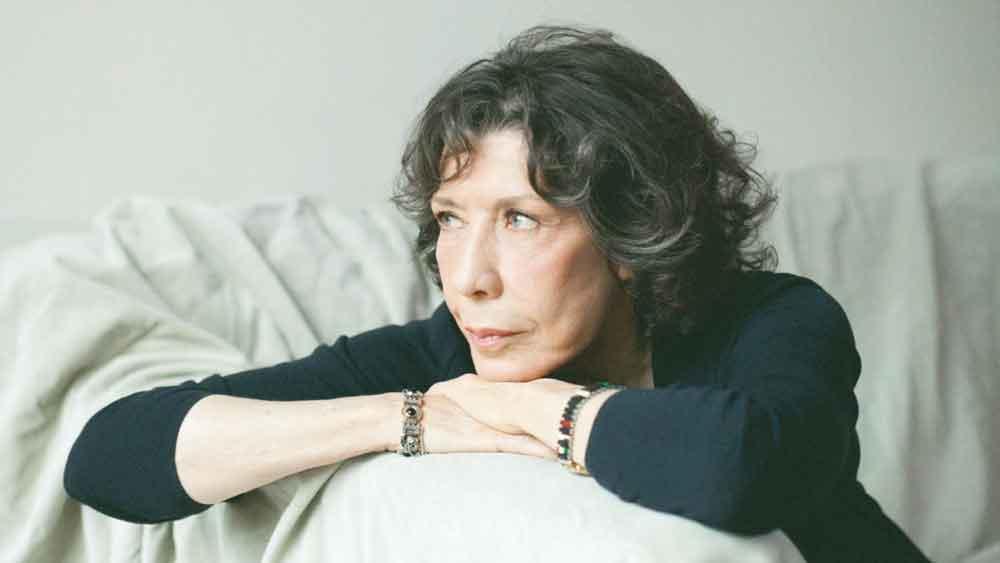Lily Tomlin, at age 76, has already had a long and storied career as an actress, comedian, writer, singer and producer. But looking back at 2015, one might think she’s just getting started.
Last year, Tomlin co-starred in the hit Netflix series “Grace and Frankie” with longtime friend Jane Fonda. They have already filmed a second season set to release June 1 and are planning a third.
Tomlin also plays the lead role in “Grandma,” a film directed by Paul Weitz that was released last year. Tomlin plays Elle, a lesbian poet coping with the death of her long-term life partner when she receives a visit from her 18-year-old granddaughter, Sage. Sage is pregnant and needs help finding $630 for an abortion.
Both the television show and the film put people in their 70s in lead roles, addressing the tangible issues of aging alongside the nuances of coming of age.
Tomlin has a stockpile of awards and honors to her name, including the 1986 Tony Award for Best Lead Actress in a Play for “The Search for Signs of Intelligent Life in the Universe,” which was written by her wife, Jane Wagner.
On Jan. 16, Tomlin will play to a sold-out audience and bring dozens of her timeless characters – such as Ernestine, Sister Boogie Woman, Mrs. Beasley and Edith Ann – to the Arlene Schnitzer Concert Hall in Portland.
I spoke to Tomlin on the phone, and she greeted me cheerily as I answered her call: “Hi. This is Lily, rooting for the streets!”
When she realized I was speaking to her from my apartment, she shared memories of her youth growing up in an apartment building in Detroit.
Sue Zalokar: What did you think of apartment living?
Lily Tomlin: It was fabulous! It was my life. I used to go from apartment to apartment, and I would play the room. You know, so I could stick around. I was so mad for everybody – the old people, the young people, the divorced people.
There was only one divorced person, and she became (a friend). Her boyfriend used to sleep over, so she was kind of the building hussy, you know.
S.Z.: Oh my, yes.
L.T.: All the women in the lobby room gossiped about her. But she was imperturbable. She was so great and vivacious.
S.Z.: So now I have this image of a young Lily running around the apartment building and building her character repertoire.
L.T.: I was! That’s what I was doing, unconsciously. I put on shows all the time.
S.Z.: What kind?
L.T.: First of all, two boys moved into the building, from Georgia. They were brothers and had red hair and freckles. I was always looking at it like a producer. So I would create material. Then I would play the characters around them.
But I could never get them to rehearse, or show up. They were just a pain in the neck.
I started doing a single, because I couldn’t count on the kids. I would imitate people I saw on television. I incorporated dance because I took tap and ballet lessons at the Department of Parks and Recreation. It was a pretty rough neighborhood, and they had a lot of programs to keep kids off the street.
S.Z.: Your parents were working class, and you were a working-class Detroit kid?
L.T.: Oh yeah. My mother and dad were from Kentucky. My dad worked; my mother didn’t work right away. She started working when I was about 12. My dad was a Southern boy. He didn’t want his woman to work.
S.Z.: It was a sign of the times, really, that mentality. I can’t imagine not working.
L.T.: Oh, absolutely! And my dad, he never owed a bill. He would pay cash for everything. He was a scream. I’d go to the horse track with him every Saturday. By the time I was about 14, when I could pass for 20, I’d place his bets.
S.Z.: Did you guys ever win?
L.T.: No. I’d hold the money back sometimes. My dad lost it. He would lose very easily. He made $100 a week or something like that. He’d bet $100 on a horse if he had it.
S.Z.: Wouldn’t he know if you didn’t have a ticket?
L.T.: No, I would nary get back by the time the race was over. And he’d be on to the next race. I’d try to feel it. I wouldn’t do it every race; I’d do it like once or twice a night so I could take the money home to my mother. Not that it was a major problem, but money is money.
S.Z.: There’s always something “uniquely Lily” – a part of you that comes out in all of your characters. Do you agree? Grandma seems to be one of those characters. You used your own clothes. Even the ’55 Dodge that Elle and Sage drive around in for much of the film is yours.
L.T.: That’s my vehicle; that’s right. One day, Paul (Weitz) told me he was going to go look at an old car for the movie. I told him I had an old car. So we went over to my house, and we looked at it. It’s kind of snazzy. We decided to use it.
S.Z.: You worked with Paul Weitz before, on his 2013 film “Admission.” You played the mother of Tina Fey’s character. How has comedy evolved for women in the span of your career?
L.T.: From the time I started, most women who were well-known then, I could almost count on one hand. (Today) there are many more women doing stand-up. They don’t make themselves the butt of the joke. They have a point of view.
I find that people who are really ridiculing of the species, I see them losing their popularity. I don’t know if that is true or not; it may just be the people that I’ve noticed as they were coming up and I think, “Oh God. Here’s another sort of macho comic doing misogynistic material.” I think that kind of comedy is falling out of favor. I don’t know if that’s true. I hope it is.
S.Z.: “Grace and Frankie” seems as much about presenting aging people as vital and sexy as it is about the friendship of these two women whose husbands of decades have come out as gay and want to marry each other.
L.T.: That’s a huge point: to make these older characters as vibrant as young ones are. Jane and I have always wanted to do a show where we could call attention to how dismissed older people are, particularly older women.
S.Z.: Whoopi Goldberg just pronounced on “The Voice” that she thinks 74 is the new middle age. What are your thoughts about ageism in Hollywood?
L.T.: It’s been present for a long time. There is a tremendous amount of product this season about older people, not to mention gay people or themes.
I hope this isn’t an aberration. I hope it continues across the board – different appreciation across the board for all ages of humanity.
Be like Joan Rivers and just give them the finger. She totally went out there and really changed her face. She’s an old friend of mine. We both worked at the Upstairs. She was a headliner, and I was in the review.
I remember when I first saw her (after she had some work done). I went on her radio show.
She was so changed. It was a bit jarring. She had no cheekbones, nothing, and then suddenly her face, because it was so filled out, (was so different). I hate to speak about her because she is dead, goddamn it. It makes me so fucking mad I can’t even think about it.
She would make fun of herself. She weathered that, but she had been around a long time.
S.Z.: You had been in a committed relationship with Jane Wagner for 42 years before the two of you formally married in 2013. So, you are looking at 45 years together.
L.T.: In March.
S.Z.: How do you and Jane make a long-term relationship work?
L.T.: We just don’t want to lose it, so we don’t.
S.Z.: You’ve never really been “in the closet.” In a very matter-of-fact way, you have always simply been who you are.
L.T.: Through the ’70s, we didn’t do that kind of stuff. I never called a press conference or anything, but I certainly wasn’t closeted.
So many of my fans across the country were really like middle Americans. And they would have been more shocked than anything. People on the East and West Coast, they wouldn’t have thought a thing about it.
In 1975, my publicist called me and told me that Time wanted to give me the cover of the magazine. This was in ’75, so it was worth something at that point. And they just want you to come out. You know, publicly.
I puzzled over it for a while and then I decided, Jane and I were in the recording studio doing my third album, “Modern Scream.” So I decided that I would put that piece on it: “The Heterosexual Conversation.” I thought that would be my answer to Time magazine for trying to lure me onto the cover.
S.Z.: What do you think about the impending presidential election?
L.T.: I don’t know if we can make things right with one presidency. Look at poor Obama. He’s just sort of vanquished in terms of his aspirations. The Republicans just absolutely set out to decapitate him.
S.Z.: You should run for president.
L.T.: Nooooooo. No I shouldn’t. You would be really disappointed if I ran for president. Maybe I’d give an address as Ernestine?
S.Z.: I don’t know. I’m thinking it might just work.
L.T.: Or Tommy Velour – sing it. I’d sing it to you. (Tomlin breaks into song.) “Because you got a good day coming along … ”
S.Z.: What are you thinking for 2016?
L.T.: Well, I’m thinking of my third season on “Grace and Frankie,” and I’m enjoying the idea of that. In the second season, we deal with a lot of issues that come out at an older age. The third season? Well, I’ll just tell you it’s going to be good!
S.Z.: Do you think about the time you have left on the planet?
L.T.: I do. I think about it very, very, very, very often. The two decades between 70 and 90 are probably the most trying to get through in good health. So I just hope to stay in good health. You, on the other hand, will just about be getting ready to get your Social Security – if they still have such a thing. If only things could be set right.


